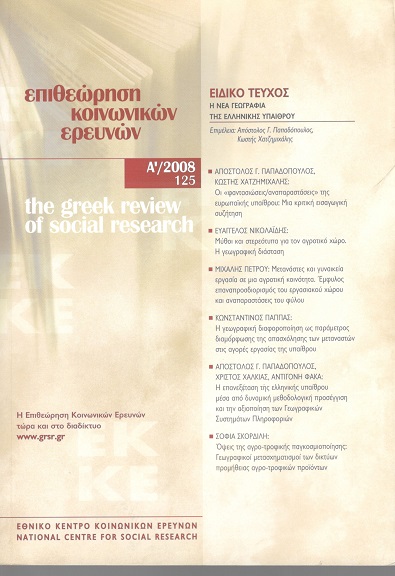Μύθοι και στερεότυπα για τον αγροτικό χώρο: η γεωγραφική διάσταση
Abstract
Στην ελληνική, κυρίως οικονομική, βιβλιογραφία για τον αγροτικό χώρο αναπαράγονται ορισμένες στερεότυπες αντιλήψεις. Οι επιπτώσεις των αντιλήψεων αυτών εντοπίζονται σε θεωρητικό, πολιτικό και οικονομικό επίπεδο, όπου έχουν και σημαντικές γεωγραφικές διαστάσεις. Οι μύθοι και οι στερεοτυπικές αντιλήψεις εγκλωβίζουν τη σκέψη, περιορίζουν το πεδίο της έρευνας, λειτουργούν αποπροσανατολιστικά στην ερμηνεία των φαινομένων, στρεβλώνουν την πραγματικότητα και συγκαλύπτουν τα ουσιαστικά προβλήματα. Ως εκ τούτου ωθούν την αναζήτηση λύσεων σε λάθος κατεύθυνση και στην επιδίωξη μη ουσιαστικών στόχων. Στο άρθρο επιχειρείται ο εντοπισμός και η κριτική σε ορισμένες από αυτές τις αντιλήψεις, αναζητούνται τα αίτια της εμφάνισης και της αναπαραγωγής τους και
αναδεικνύονται οι επιπτώσεις από την άκριτη υιοθέτηση τους.
Article Details
- How to Cite
-
Νικολαΐδης Ε. (2016). Μύθοι και στερεότυπα για τον αγροτικό χώρο: η γεωγραφική διάσταση. The Greek Review of Social Research, 125, 21–40. https://doi.org/10.12681/grsr.9895
- Section
- Articles

This work is licensed under a Creative Commons Attribution-NonCommercial 4.0 International License.
Authors who publish with this journal agree to the following terms:
- Authors retain copyright and grant the journal right of first publication with the work simultaneously licensed under a Creative Commons Attribution Non-Commercial License that allows others to share the work with an acknowledgement of the work's authorship and initial publication in this journal.
- Authors are able to enter into separate, additional contractual arrangements for the non-exclusive distribution of the journal's published version of the work (e.g. post it to an institutional repository or publish it in a book), with an acknowledgement of its initial publication in this journal.
- Authors are permitted and encouraged to post their work online (preferably in institutional repositories or on their website) prior to and during the submission process, as it can lead to productive exchanges, as well as earlier and greater citation of published work (See The Effect of Open Access).



